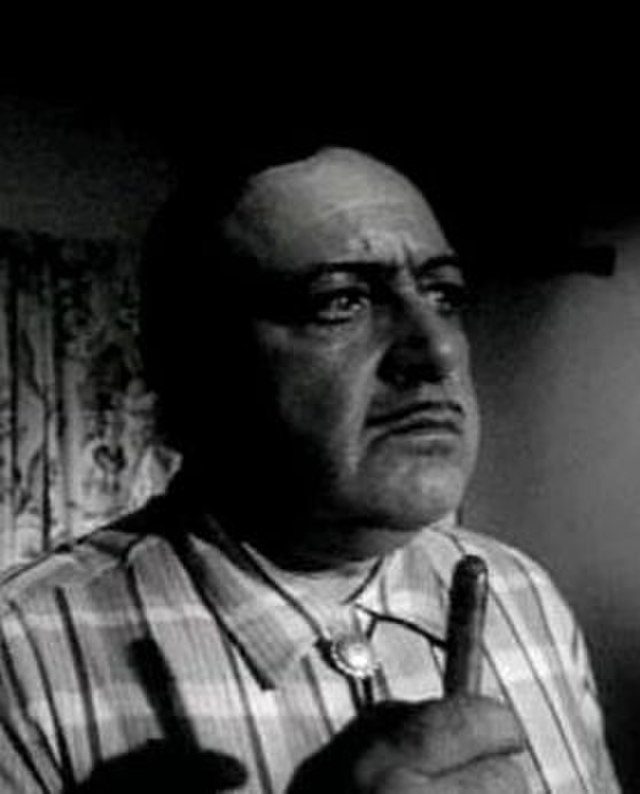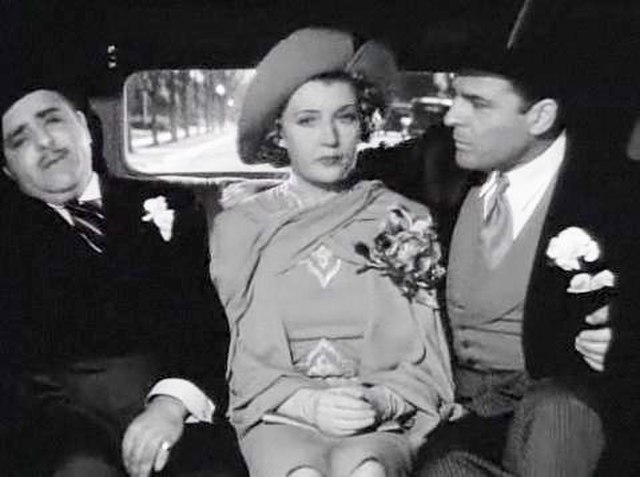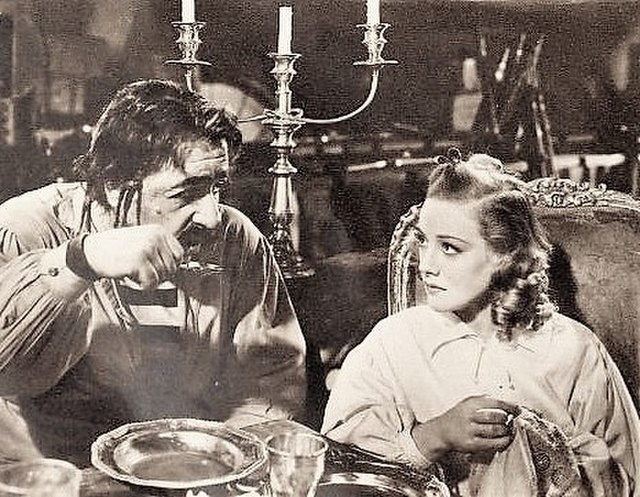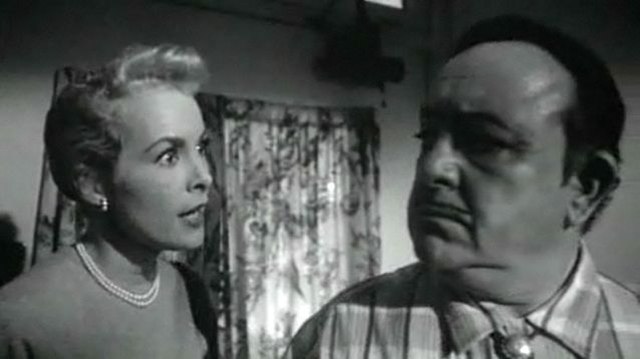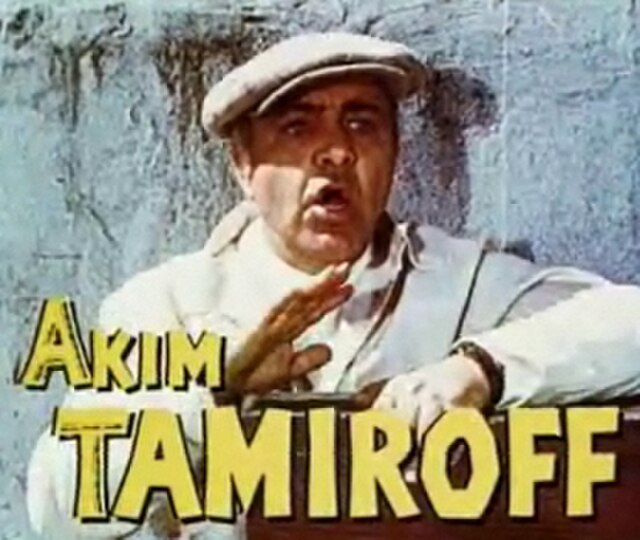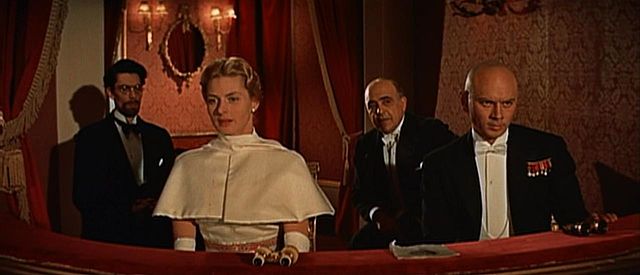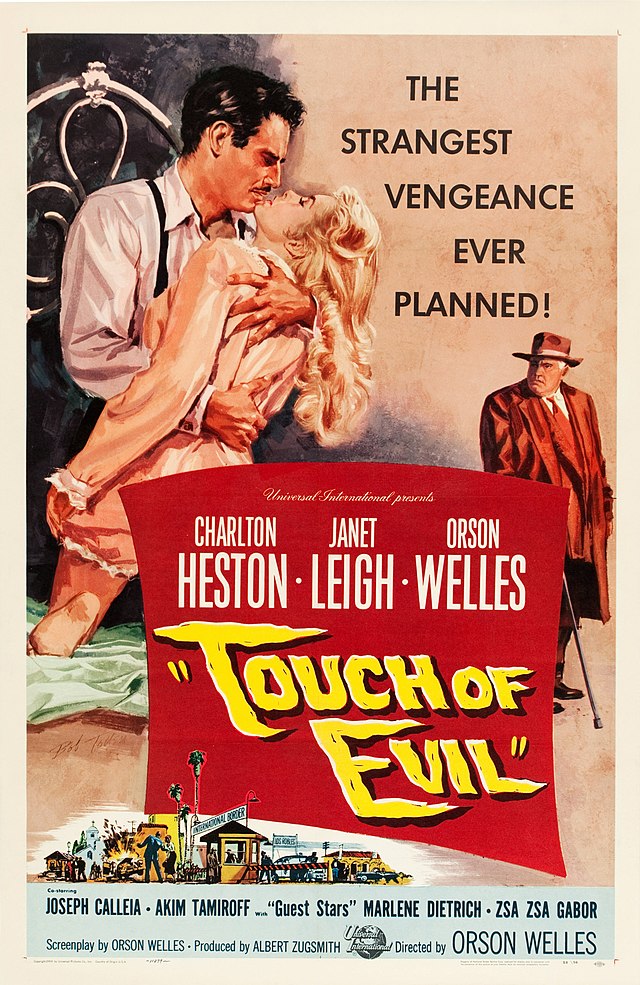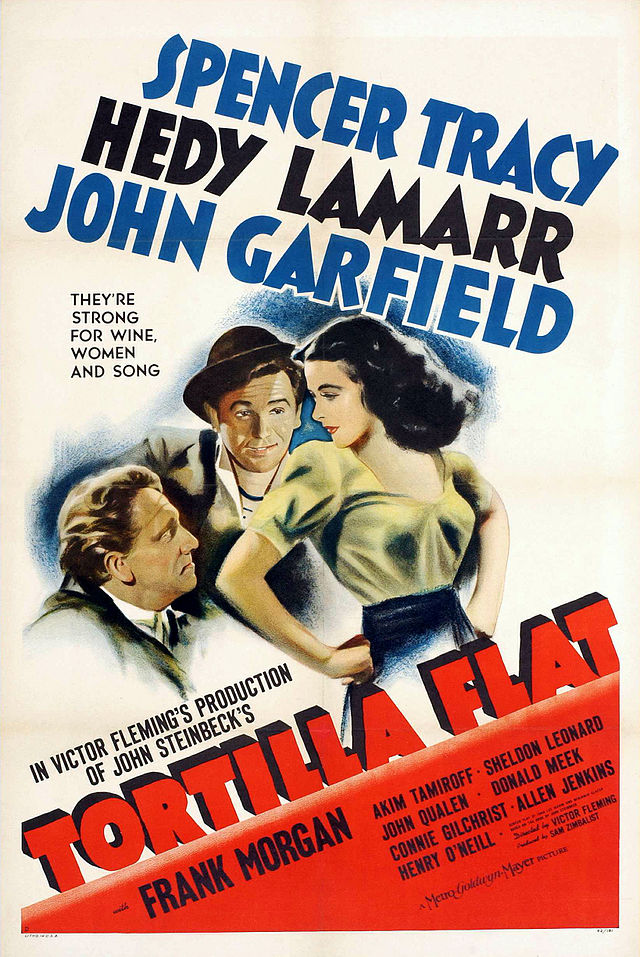Akim Tamiroff
back| Full Name | Hovakim |
| Stage Name | Akim Tamiroff |
| Born | October 29, 1899 |
| Birthplace | Tiflis (now Tbilisi), Georgia, then part of the Russian Empire |
| Died | September 17, 1972 |
| Buried | Forest Lawn Memorial Park, Glendale, California, USA |
| Married to | Tamara Shayne, an actress |
| Children | None |
| Notable films | The General Died at Dawn (1936) - For Whom the Bell Tolls (1943) - Touch of Evil (1958) - Topkapi (1964) |
Akim Tamiroff
The Character’s Character
Akim Tamiroff was an Armenian-American actor known for his robust character roles, often playing villains or quirky characters with memorable charisma. Trained at the Moscow Art Theatre, he immigrated to the United States in the 1920s and became a distinguished stage actor.
Tamiroff found success in Hollywood in the 1930s, often cast as a "tough guy" or in ethnic roles. His gravelly voice, heavy accent, and physical presence made him a unique character actor in an era when diverse representation was limited.
Related
Akim Tamiroff (1899 – 1972)
Biography and Movie Career
Akim Tamiroff, born Hovakim Tamiroff on October 29, 1899, in Tiflis (now Tbilisi, Georgia) in the Russian Empire, was an Armenian-American actor celebrated for his distinctive roles as a character actor in Hollywood’s Golden Age. Growing up in a time of political and cultural upheaval, Tamiroff was immersed in a world that fostered resilience and adaptability, traits that would later serve him well in his acting career.
Early Life and Education
Tamiroff was born to Armenian parents in Tiflis, a city known for its rich multicultural heritage. From a young age, he showed an interest in performance, which was nurtured in a city that was a cultural melting pot, filled with theater, music, and diverse artistic influences. This early exposure likely influenced his decision to pursue acting seriously. He moved to Moscow in his early twenties to attend the Moscow Art Theatre, where he received formal training in the Stanislavski method, a style that emphasizes psychological realism. His time at the Moscow Art Theatre would prove invaluable, not only honing his skills but also instilling a profound respect for the art of storytelling.
Emigration and Hollywood Beginnings
In the early 1920s, as political changes swept across Russia, Tamiroff immigrated to the United States in search of better opportunities. He initially settled in New York, where he joined various theater productions, working on both Broadway and Off-Broadway stages. Known for his thick accent and distinct voice, he initially found it challenging to land roles outside of stereotyped ethnic characters. Nonetheless, his commanding presence and dedication to his craft soon set him apart.
He moved to Hollywood in the early 1930s, where he made a breakthrough as a character actor. His early film work in Anastasia (1931) and Flesh and the Devil (1931) showcased his talent, and soon he was cast in more significant roles. In 1936, he starred in The General Died at Dawn, for which he received his first Academy Award nomination for Best Supporting Actor. This role was a milestone, as it elevated him from bit parts to more substantial supporting roles, often portraying charismatic villains or eccentric figures.
Rise to Fame and Notable Roles
Tamiroff’s career soared in the 1940s, with his second Oscar-nominated role in For Whom the Bell Tolls (1943). He portrayed Pablo, a complex character with both heroic and cowardly traits, embodying the psychological depth he had mastered at the Moscow Art Theatre. His performance was lauded for its intensity and nuance, establishing him as one of Hollywood’s premier character actors.
Throughout his career, Tamiroff specialized in playing morally ambiguous or outright villainous characters. He starred in The Buccaneer (1938), directed by Cecil B. DeMille, and collaborated multiple times with legendary director Orson Welles. In Welles' Touch of Evil (1958), he played Joe Grandi, a grotesque and memorable figure in a film widely regarded as a classic in the film noir genre. Tamiroff’s portrayal added a layer of authenticity to the movie’s atmosphere, with his exaggerated expressions and tense physicality.
His later career included roles in Ocean’s 11 (1960) alongside the Rat Pack, and Topkapi (1964), where he played a memorable role as a cunning and eccentric gang leader. Though he was often cast in supporting roles, his screen presence was so magnetic that he frequently overshadowed leading actors, even with limited screen time.
Personal Life and Marriage
Tamiroff married actress Tamara Shayne, also of Russian descent, who had immigrated to the United States and found her own success in Hollywood. The couple shared a deep bond and common cultural heritage, which helped them navigate the challenges of Hollywood. Their marriage was, by all accounts, a happy and enduring one. Despite the rigors of their careers, they supported each other and often socialized within a close-knit circle of émigré artists. They had no children but were known for their hospitality and for creating a home that was a gathering place for other Russian and Armenian expatriates in Hollywood.
Passions and Interests
Outside of acting, Tamiroff was known for his passion for art and music. A lover of literature and classical Russian music, he was often found reading or listening to music when not on set. He was also passionate about theater, frequently attending stage productions and supporting young actors. Tamiroff had an understated sense of humor and was often described as warm, humorous, and generous by his friends and colleagues.
Later Years and Death
In his later years, Tamiroff continued to work in films, taking on roles that allowed him to maintain his trademark style. However, by the late 1960s, his health began to decline, limiting his appearances. Despite these challenges, he remained committed to his craft, acting in films whenever possible.
Akim Tamiroff passed away on September 17, 1972, at the age of 72 in Palm Springs, California, after suffering from cancer. His death marked the end of an era for character actors who brought distinct voices and backgrounds to Hollywood. He was buried at Forest Lawn Memorial Park in Glendale, California, where fans and colleagues paid their respects.
Legacy
Tamiroff's legacy is defined by his ability to bring depth and gravitas to supporting roles. He was one of the first actors of Armenian descent to gain recognition in Hollywood, paving the way for greater diversity on screen. His work in classic films, particularly in the noir genre, remains influential, and his performances continue to captivate audiences.
Video Bio on Akim Tamiroff
Vocal Acting Style of Akim Tamiroff
Akim Tamiroff’s acting style was a striking blend of physicality, vocal distinctiveness, and emotional intensity. Known for his gruff voice and thick accent, Tamiroff brought a unique authenticity to each character, particularly those with ambiguous or villainous qualities. His performances often relied on an intricate balance between humor and menace, making him an actor capable of playing complex, multidimensional roles that went beyond stereotypes.
Physicality and Presence
Tamiroff’s physical presence was essential to his style. He had a robust, sometimes imposing build, which he used to convey authority or intimidation, especially when playing warlords, mobsters, or unscrupulous authority figures. Yet, despite his solid stature, he was known for a subtle physical expressiveness that allowed him to shift effortlessly from menacing to comedic, often within the same role. Tamiroff’s movements were deliberate, and he used small gestures—an intense look, a slow turn of the head, a sudden pause—to draw the audience into his character’s emotional landscape. His facial expressions were vivid and deeply engaged with the character's psychological state, allowing him to portray inner conflict, suspicion, or cunning with minimal effort.
Vocal Style and Accent
Tamiroff’s thick, almost gravelly accent was as much a signature as his physicality. Far from limiting him, his distinctive voice added layers of complexity to his characters, infusing each line with a sense of foreignness that helped define him in Hollywood as an “exotic” character actor. His voice was flexible within its deep timbre, allowing him to shift between warm, avuncular tones and threatening growls, depending on the role. When he spoke, Tamiroff often seemed to command the scene, his voice demanding attention and conveying a sense of mystery. This vocal command allowed him to inhabit characters that were often morally ambiguous, creating tension in scenes where his tone and accent kept audiences guessing his true intentions.
Emotional Depth and Psychological Realism
Tamiroff’s training at the Moscow Art Theatre endowed him with an appreciation for psychological realism, which was evident in his performances. Even in roles where he had limited screen time, he imbued his characters with layers of emotional depth. Tamiroff could convey pathos, fear, anger, or cunning with subtle changes in his expression or intonation, a skill he used to remarkable effect in films like For Whom the Bell Tolls and Touch of Evil. He excelled at playing conflicted characters who were neither fully good nor entirely evil, which gave his performances a sense of realism uncommon in many Hollywood films of his time. In For Whom the Bell Tolls, for instance, he portrayed Pablo as a complex mixture of bravery and cowardice, pride and shame—qualities that made his performance both unpredictable and haunting.
Blending Humor with Menace
One of Tamiroff’s most distinctive traits was his ability to blend humor with a menacing edge. His comedic timing was often paired with a sinister undertone, creating an almost absurdist tension in scenes where his characters displayed both charm and ruthlessness. In films like The Black Sleep and Topkapi, he was able to elicit laughter from the audience, even as his characters engaged in morally questionable behavior. Tamiroff’s humor was often self-deprecating or sarcastic, adding a layer of irony to his performances. This quality became especially useful in his collaborations with Orson Welles, who appreciated Tamiroff’s ability to bring a twisted levity to noir roles, as seen in Touch of Evil, where his portrayal of Joe Grandi was simultaneously grotesque, humorous, and unsettling.
Adaptability Across Genres
Tamiroff's adaptability was another cornerstone of his style. He appeared in genres ranging from historical dramas to Westerns, comedies, war films, and film noir, adapting his style to suit each. In historical dramas like The Buccaneer and Anthony Adverse, he used a more regal, dignified approach, emphasizing the character’s gravitas and authority. Conversely, in comedies like Ocean’s 11, he embraced a lighter, more playful demeanor, often leaning into his accent and exaggerated expressions for comedic effect. This versatility allowed him to avoid being pigeonholed entirely as a “heavy” or a villain, even though he was often cast in such roles. Tamiroff could add a spark of mischief or self-awareness to his performances, making him as effective in heist films as he was in noir or period dramas.
Legacy and Influence
Tamiroff’s style left a lasting impression on Hollywood, particularly among character actors who followed in his footsteps. His nuanced portrayal of morally ambiguous characters paved the way for a new type of antihero and demonstrated that supporting roles could be as complex and memorable as lead ones. His ability to convey layered emotions through minimal but precise gestures and his mastery of balancing humor with a sense of foreboding made him an influential figure, especially among actors seeking to portray multidimensional villains. Tamiroff’s approach, marked by authenticity, dedication to craft, and the subversion of stereotypes, endures as an example of character acting at its finest.
Memorable Quotes on Acting and Career
• On being cast as villains and ethnic characters:
"I've been a gangster in every language except Greek. I tried, but I couldn't master the accent."
This lighthearted remark showcases Tamiroff’s humor about his typecasting in Hollywood, where he often played villains and characters with foreign backgrounds.
• On his thick accent and playing non-American roles:
"I’m an Armenian who plays Russians, Frenchmen, Italians, Indians, and Chinese. Anything but Armenian."
Tamiroff's comment highlights the paradox he faced in Hollywood: while his Armenian background gave him a unique identity, it was rarely recognized, as he was usually cast as other ethnicities.
• On playing villains with charm:
"Even the bad guy has a heart. Sometimes, it’s just buried very deep."
This insight speaks to Tamiroff’s understanding of his roles, where he often added layers of humanity to characters that could have been mere caricatures.
Memorable Lines from His Films
• From Touch of Evil (1958), as Joe Grandi:
"Vargas, Vargas, you’re a bright boy. You gotta put down what’s in your mind and pick up what’s in your fist."
This line is emblematic of the gritty, streetwise characters Tamiroff often played in noir films, delivering his lines with a mix of humor and menace.
• From The General Died at Dawn (1936), as General Yang:
"The end justifies the means. I fight for peace."
As General Yang, Tamiroff delivered this line with a chilling irony, capturing the character's moral ambiguity.
• From For Whom the Bell Tolls (1943), as Pablo:
"A man fights best when he fights for himself."
This line reflects the inner turmoil and selfishness of his character Pablo, a morally complex guerilla fighter. Tamiroff delivered it with a sense of conflict, adding depth to his role.
• From Topkapi (1964), as Gerven the cab driver:
"Everybody’s honest. Until they get a better offer."
This line epitomizes Tamiroff’s knack for portraying characters with a certain cynical charm, blending humor with the hint of opportunism.
Offscreen Anecdote
• On his career in Hollywood:
When once asked how he managed to stay so prolific in Hollywood despite his thick accent and unique look, Tamiroff reportedly responded, "I make the most out of the least, and sometimes that's enough for a good part."
Awards and Recognition
Akim Tamiroff was widely recognized for his talent as a character actor and received notable awards and nominations throughout his career, though he didn’t amass a vast collection of accolades like some of his contemporaries.
Academy Award Nominations
• Best Supporting Actor for The General Died at Dawn (1936): This was Tamiroff's first Academy Award nomination, recognizing his portrayal of General Yang, a ruthless Chinese warlord. His intense, nuanced performance was groundbreaking for the time and earned him widespread acclaim.
• Best Supporting Actor for For Whom the Bell Tolls (1943): His second Oscar nomination came for his role as Pablo, a complex and morally ambiguous guerilla leader in this adaptation of Ernest Hemingway's novel. This role is considered one of his finest performances, showcasing his ability to blend vulnerability with menace.
Golden Globe Awards
• Golden Globe for Best Supporting Actor in a Motion Picture for For Whom the Bell Tolls (1943): Tamiroff won the Golden Globe for his role as Pablo, which further cemented his reputation as a leading character actor in Hollywood. His performance was celebrated for its depth and psychological realism, capturing the inner conflict of a flawed but fascinating character.
National Board of Review
• National Board of Review Award for Best Acting in For Whom the Bell Tolls (1943): Along with his Academy Award and Golden Globe recognition, Tamiroff received praise from the National Board of Review, which acknowledged his powerful supporting performance. This additional recognition underscored his impact in one of his most acclaimed roles.
Other Recognition
• Influence in Hollywood and Collaboration with Orson Welles: While not a formal award, Tamiroff’s collaborations with renowned director Orson Welles, especially in Touch of Evil (1958), are a testament to his reputation and skill. Welles appreciated Tamiroff’s ability to bring humor and menace to noir roles, and their professional relationship added to Tamiroff’s standing as one of Hollywood’s most versatile character actors.
• Recognition as a Pioneer of Armenian-American Actors in Hollywood: Although not an award, Tamiroff is often celebrated as one of the first actors of Armenian descent to gain significant recognition in American cinema. His success paved the way for future generations of actors from diverse backgrounds.
Movies Starring Akim Tamiroff
1932
• Okay, America! – A satire on sensational journalism, Tamiroff appears in a minor role as a journalist.
1934
• The Captain Hates the Sea – A comedy-drama about a group of eccentric passengers on a cruise ship, including a writer struggling with alcoholism. Tamiroff played a supporting role, showcasing his knack for playing quirky characters.
1936
• The General Died at Dawn – Tamiroff’s breakout role as General Yang, a ruthless Chinese warlord. His portrayal earned him an Academy Award nomination for Best Supporting Actor.
• Anthony Adverse – A historical drama following the adventures of an orphaned boy. Tamiroff plays a supporting role, adding a layer of intrigue to the story.
1937
• High, Wide and Handsome – A musical adventure about the oil industry in 19th-century Pennsylvania. Tamiroff plays a villainous oil baron, showcasing his talent for playing antagonists.
1938
• The Buccaneer – A historical drama directed by Cecil B. DeMille, in which Tamiroff plays Dominique You, a pirate aiding General Andrew Jackson during the War of 1812.
• Spawn of the North – An action-drama about salmon poachers in Alaska. Tamiroff plays a scheming villain, adding tension to the story.
1939
• The Great Man Votes – A political drama where Tamiroff plays a minor role as a community leader. The film centers on a former Harvard professor who tries to rebuild his life in a small town.
1940
• North West Mounted Police – A Western directed by Cecil B. DeMille. Set in Canada, it follows a Mountie attempting to bring a rebel leader to justice. Tamiroff plays an informer and adds suspense to the narrative.
1942
• Tortilla Flat – A comedy-drama based on John Steinbeck's novel about a group of Mexican-Americans in Monterey, California. Tamiroff plays a mischievous character who gets into various comedic predicaments.
1943
• For Whom the Bell Tolls – Tamiroff plays Pablo, a morally conflicted guerrilla fighter in this adaptation of Ernest Hemingway's novel. His performance earned him his second Academy Award nomination.
• Five Graves to Cairo – A WWII spy thriller about a British soldier who uncovers a German plot in Egypt. Tamiroff plays a hotel owner caught in the crossfire of intrigue and espionage.
1944
• The Bridge of San Luis Rey – Set in 18th-century Peru, this drama follows five people whose lives intersect on a bridge. Tamiroff plays a priest involved in the investigation of their deaths.
1945
• A Bell for Adano – A WWII drama about an Italian town liberated by American troops. Tamiroff plays an Italian mayor trying to restore order amid post-war chaos.
1946
• The Virginian – A Western about a cowboy seeking justice for his friend’s murder. Tamiroff plays a supporting role as the town barber.
1954
• Night People – A Cold War thriller about an American GI abducted in Berlin. Tamiroff plays a supporting role, adding to the film’s sense of espionage and danger.
1955
• Mr. Arkadin – Directed by Orson Welles, this thriller follows an American investigating the past of a reclusive tycoon. Tamiroff plays Mily, a character shrouded in mystery and suspicion.
1956
• The Black Sleep – A horror film where Tamiroff plays Udu, an assistant to a mad scientist conducting brain experiments on unwilling subjects.
1958
• Touch of Evil – Directed by Orson Welles, this iconic film noir features Tamiroff as Joe Grandi, a sleazy crime boss whose underhanded tactics drive the story’s tension.
1959
• The Miracle – A religious epic about a young woman who falls in love with a soldier, abandoning her convent. Tamiroff plays a minor role in this historical drama.
1960
• Ocean’s 11 – A heist film starring Frank Sinatra and the Rat Pack, where Tamiroff plays a character involved in the complex casino heist plot.
1962
• The Wonderful World of the Brothers Grimm – A fantasy film about the lives and works of the Grimm brothers. Tamiroff plays a supporting character adding to the film’s whimsical atmosphere.
1964
• Topkapi – A heist film about a group attempting to steal a jeweled dagger from a Turkish museum. Tamiroff plays a humorous role as a bumbling, nervous accomplice, offering comedic relief.
• The Night of the Generals – A WWII thriller in which Tamiroff plays a supporting role, contributing to the film’s tense atmosphere around military and political intrigue.
1965
• Lord Jim – Based on Joseph Conrad’s novel, the film follows an idealistic young British seaman. Tamiroff plays a supporting role as part of a group of pirates, adding depth to the story’s exotic and dangerous setting.
1967
• Casino Royale – A James Bond parody where Tamiroff plays Le Chiffre’s henchman, adding a comedic twist to the classic Bond villain role.

